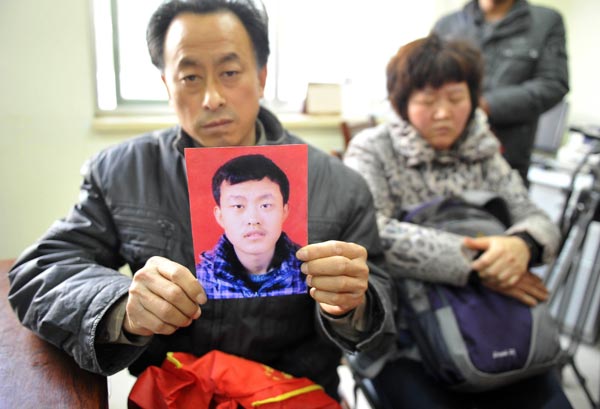Regulation to improve public organ donations
|
 |
|
Yan Yufang holds a picture of his son Yan Sen, who died for cerebral hemorrhage and donated body organs to five people in Jinan, Shandong province, March 20, 2013. Wang Yuan/for China Daily
|
The 200-plus coordinators at the center will be evaluated and licensed, according to the regulation, said Gao Xinpu, a division director at the center.
"A team of at least 2,000 coordinators will be set up across the mainland. Their main job will be to identify potential organ donors, approach their families and inform them of a possible donation, and handle issues like the donor's funeral," he told China Daily on Monday.
Gao said many coordinators will come from medical institutions, including transplant hospitals, which are in a position to encounter potential donors.
When a donation is secured, the coordinators "will enter the information on the donor and donated organ into a computerized registry, and inform a designated organ procurement organization for further distribution," he said.
The registry system will be launched in September or October, Gao said.
Meanwhile, transplant hospitals have been busy building up their own organizations to handle identifying potential donors, referral, organ donation medical evaluation, allocation, removal, reservation and transportation, said Huang Jiefu, director of the China Organ Donation Committee and the former vice-minister of health.
Currently, transplant hospitals may establish such organizations, but in the future, Huang expects organ procurement organizations will be independent entities that operate within a designated area.
Huang said the National Health and Family Planning Commission will soon issue regulations ordering compulsory use of a software-based organ allocation system.
"Only medical indicators such as the severity of the patients' disease, waiting time and organ match situation are ranked during the process," he said, adding that the process is free from human intervention.
Gao, however, disagrees.
Implementing compulsory use could hurt transplant hospitals, which might fear that the organs they harvest will be distributed to others, he said.
Meanwhile, the proximity of the donor to the recipient is also considered during the process, said Zhu Jiye, chief surgeon at Peking University People's Hospital.
"As long as hospitals can use the system accordingly, we welcome the initiative," he said.
Beijing currently does not have a public organ donor system. A trial system that did not include the capital was launched in 2010 by the National Health and Family Planning Commission and the Red Cross Society of China. It has expanded to about 19 regions of the mainland.
Zhu said Beijing still relies on executed prisoners as a major source of organ donations.
"But the number of organs harvested this way just kept plummeting. So it's time to push forward the public organ donation system," he said.
According to Huang, the Red Cross Society is responsible for raising public awareness of lifesaving organ donations, setting up a volunteer registry and helping train donation coordinators.
The rest of the responsibilities, such as licensing coordinators, allocating donated organs, and the management and supervision of transplant hospitals, are under the jurisdiction of the National Health and Family Planning Commission.
"The Red Cross could serve as a third-party supervisor," Huang said.
Zhu agreed, adding that public organ donation work could begin in Beijing even without local Red Cross participation.
Huang said that building strong organ procurement organizations is the foundation of the donation and allocation system.
He expects that a professionally trained organ coordinator under an organ procurement organization will be stationed at each hospital to improve the efficiency of potential donor detection and referrals.
Also, given that the coordinating work is highly professional and involves dealing with hospitals, "they should only be recognized and licensed by the top health authority," he said.
Gao has a different outlook.
"In practice, all stakeholders have to work in line with existing rules and regulations," he said, citing the upcoming regulation on coordinator management.
Gao said shedding the direct connection between coordinators and transplant hospitals or organ procurement organizations could better ensure a fair practice.
Registration Number: 130349



























